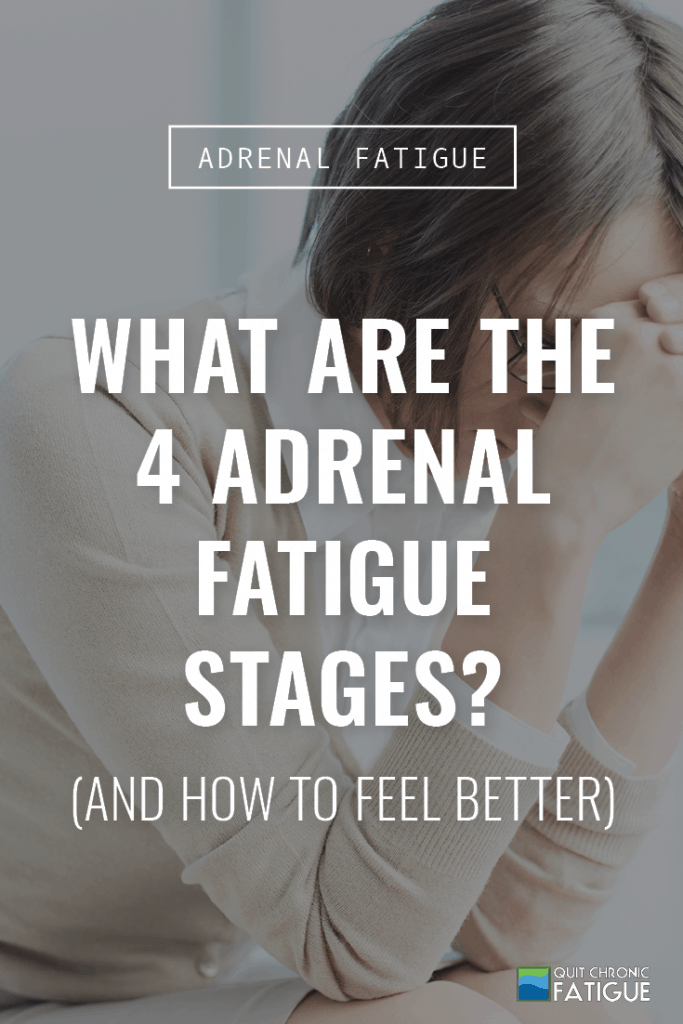In our fast-paced modern life, adrenal fatigue has become a common condition. We all seem to live with too much daily stress in our lives. These stresses, both physical and mental, are sometimes too much for us to cope with and leave us exhausted and experiencing burnout and adrenal fatigue. There are 4 adrenal fatigue stages people go through and everyone’s experience is different.
This article will give you an introduction to the 4 adrenal fatigue stages and how to start to feel better.

What is Adrenal Fatigue?
If you’ve been under stress for a long period of time you could be experiencing adrenal fatigue. The stress could be either mental, emotional, or physical stress.
Long-term stress can come from either having a stressful job, shift work, or having too much to do every day and never getting it all done. This kind of stress starts to build up over time.
Other examples are single parents trying to juggle everything in their daily life all by themselves while trying to maintain a full-time job.
All those extremely stressful situations can take their toll on your body and produce symptoms of adrenal fatigue when they go on for long periods of time.
Your adrenals produce the anti-stress hormone called cortisol. When you are constantly stressed, your adrenals are overworked and cortisol levels drop.
Some symptoms that are said to be due to adrenal fatigue include:
- Tiredness
- Trouble falling asleep
- Trouble waking in the morning
- Salt and sugar cravings
- Needing caffeine all day
These symptoms are common and can be associated with many diseases leaving it hard to diagnose adrenal fatigue. Talk to your professional caregiver to determine if you are experiencing any of the 4 adrenal fatigue stages.
The 4 Adrenal Fatigue Stages
There are 4 stages associated with adrenal fatigue. As each stage progresses the condition worsens and leads to adrenal exhaustion. Hormones and neurotransmitters drastically fluctuate during the 4 stages.
This journey can be different for every person. Here is an overview of the 4 adrenal fatigue stages.
Stage 1: Alarm/Alert
This stage is when your body is bombarded with different types of stressors that are considered aggressive or extreme.
Examples of that could be something as simple as a hospital visit or a new job interview. Or it could be a severe financial problem.
In this stage, your flight or fight response switches on. Your body is then flooded with anti-stress hormones like adrenaline, norepinephrine, and cortisol.
This type of response to a very stressful situation is normal and healthy. But if the stress continues for a long period of time, this reaction can become chronic.
Usually in this stage fatigue is mild. It might not even be very noticeable. Some people may turn to drinking more caffeine to offset their tiredness. They may also use energy shots or high carb foods.
At this stage, you’re able to produce the right amount of anti-stress hormones that you need.
Stage 2: Dismay Response
The second stage of the adrenal fatigue stages is when your stress has become chronic.
At this stage, your adrenals can’t produce enough cortisol to meet the stress demands. Your stress response systems begin to feel overloaded.
This is the point where you start to notice your fatigue starting to get in the way of all your daily activities whether at home or at work.
You might start to experience new symptoms like:
- Irritability
- Anxiety
- More colds and cases of flu
- Insomnia
- Never feeling rested after sleep
- Digestive issues
- Depression
- Nervousness
- More aches and pains
- Elevated blood pressure
If adrenal fatigue is not addressed at this stage, it will progress to the next stage.
Stage 3: Meet the Resistance
During this phase, your endocrine system focuses more on producing stress hormones. Because of the high stress, your adrenals have been overworked in this stage to the point of exhaustion. Your cortisol output drops and your body tries to conserve energy while not receiving enough levels of cortisol.
At this stage, you will experience exhaustion and anxiety. Some other symptoms in this stage are lack of enthusiasm, a drop in quality of life, restlessness, and regular infections can be common.
You may start to experience the side effects of adrenal crashes. Your recovery from each crash could take longer than before.
Some of your organs begin to slow down to conserve energy. When digestion slows down you start to experience constipation.
Adrenal exhaustion at this stage means you’re unable to function normally. The usual coping mechanisms like coffee or other stimulants, don’t work anymore. This is how this stage differs from the other stages of adrenal fatigue.
Stage 4: Burnout/Crash
Most people never reach this phase. Usually, people discover they have adrenal fatigue in stage 3 and begin a process to feel better.
In stage four, your adrenal glands have ceased to function. During this final stage of burnout, people have more severe symptoms.
New symptoms can happen quite suddenly. It can be intense pain in the legs, abdomen and lower back, severe vomiting, dehydration, constipation, fainting, or a drop in blood pressure. Other symptoms are lack of sex drive, depression, restlessness, and anxiety.
How to Cope With Each Stage
Every individual is different so each person with adrenal fatigue has different symptoms. Each phase for each person is very different also. Therefore, the recovery for each person is very individualized.
Recovery must take into account your age, weight, sex, your lifestyle, your needs, and your current state of health.
For example, depending on which stage you’re in, exercise would affect you differently. If you are in stage one, you’re more capable of exercising than if you’re in stage 3. In stage 3, too much exercise can actually be harmful and add more stress to your body. It would be better to focus on rest and sleep in stage 3.
The Adrenal Fatigue Diet
The adrenal fatigue diet is recommended for every stage. This diet follows the guidelines of most recommended diets.
It includes eating more protein, vegetables, and whole grains while decreasing sugar, fried foods, caffeine, and processed foods.
Related: Why A Keto Low Carb Diet Plan Is Not Good For Adrenal Fatigue Syndrome
Decrease Stress
The next important step to take for every stage is to decrease stress.
This can be done by practicing several stress-relieving activities like:
- Meditation
- Staying away from blue light(computers, phones, Netflix)
- Deep breathing
- Get plenty of sunshine
- Go for more walks in nature
- Do relaxing hobbies
- Read calming books
- Get enough sleep
- Say no to unnecessary outings
- Do less than you usually do
Taking Supplements
Supplements can be good if taken correctly.
Be sure to first talk to a healthcare professional before taking any supplements if you have AFS. They should be taken at the right time and the right dosage.
No matter what stage of the 4 adrenal fatigue stages you’ve reached, recovery is possible. But it’s important that you get back to being healthy with help and support from professionals.
Be sure to get a full diagnosis from your doctor if you’re feeling tired, weak, or depressed. Try to reduce your stress and begin to live a healthy lifestyle.




